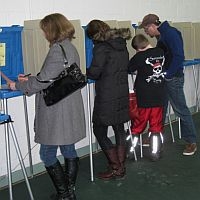
(Host) Despite the difficult economic climate, a vast majority of local school budgets passed at Town Meeting.
School officials think that’s because many school boards spent months preparing level funded budgets for voters to consider.
VPR’s Bob Kinzel reports.
(Kinzel) According to an unofficial tally conducted by the Vermont Superintendents’ Association, roughly 95 percent of all local school budgets were adopted by voters – and in many cases – the budgets were approved by fairly wide margins.
228 budgets were approved, 13 were defeated and 4 were passed with cuts. Last year 21 school budgets were rejected by voters.
Jeff Francis is the executive director of the Superintendents’ Association.
He thinks many budgets passed because local school boards were well aware of the state of the Vermont economy:
(Francis) "I think school boards for the most part have been working for 4 or 5 or 6 months to come in with the most responsible budgets that they possibly can. I think they are reflective of the economic times – as is evidenced by the fact that many communities around the state – budgets are actually lower than they were last year…So I think the voters responded to that and passed what they felt were budgets reflecting that kind of an effort."
(Kinzel) In order to achieve a level funded budget, Francis says a number of school boards have had to reduce personnel costs and cut programs:
(Francis) "Local school officials are making difficult decisions in terms of staffing, programs, and other areas where they could realize some savings. So I think that there’s a story in each and every community about how these budgets came in where they did. But again, the indication that I have anecdotally is that it came from areas right across the board."
(Kinzel) Several years ago, lawmakers passed what is known as the "two vote school budget" law. It was designed to keep local education costs down.
It applies only to schools that spend more than the statewide average and the budget increase must be greater than inflation plus one percent. If these two conditions are met, a second school budget vote is held on all spending above this threshold amount.
Francis doesn’t think the two vote law had much of an impact on the development of school budgets this year:
(Francis) "So it’s not a surprise to me that only one district might have triggered that ‘two vote’, because I think that the effort was really to come in as close to a zero percent increase as possible."
(Kinzel) Francis says an additional 22 communities will vote on their local school budgets at a later date.
For VPR News, I’m Bob Kinzel in Montpelier.